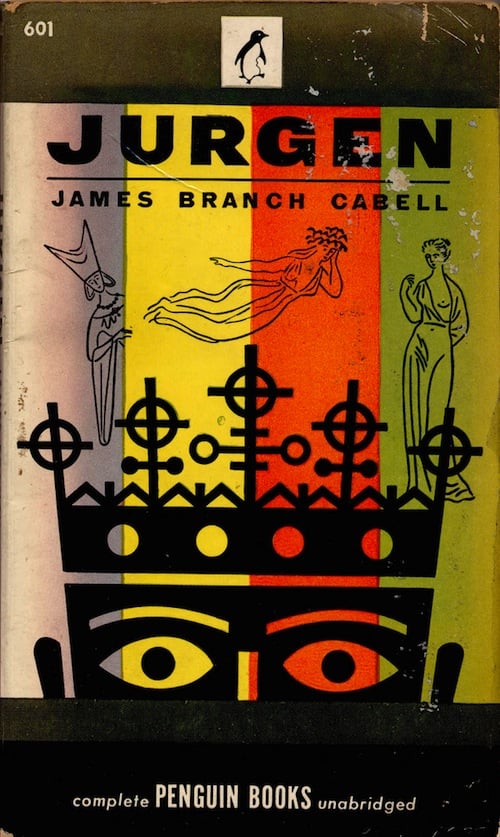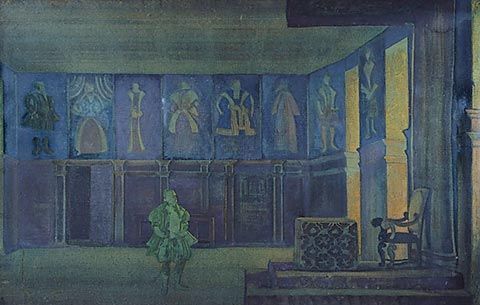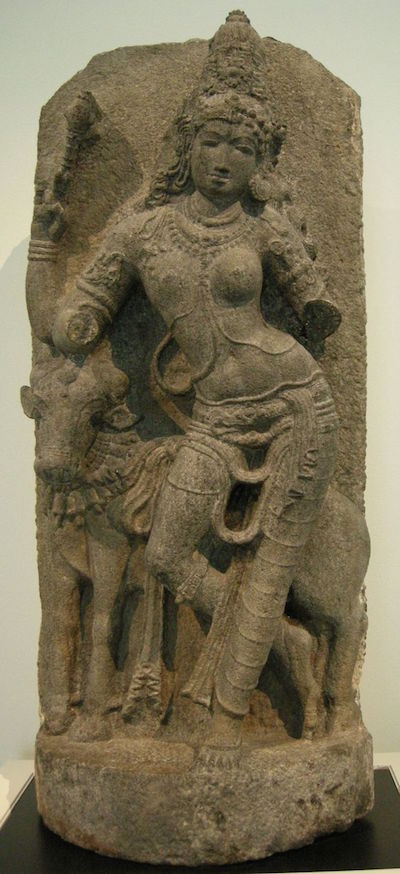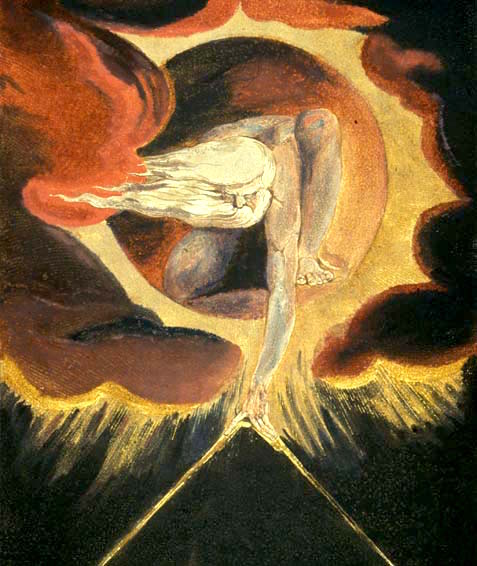Jurgen (45)
By:
January 22, 2016

James Branch Cabell’s 1919 ironic fantasy novel Jurgen, A Comedy of Justice, the protagonist of which seduces women everywhere he travels — including into Arthurian legend and Hell itself — is (according to Aleister Crowley) one of the “epoch-making masterpieces of philosophy.” Cabell’s sardonic inversion of romantic fantasy was postmodernist avant la lettre. HiLoBooks is pleased to serialize Jurgen here at HILOBROW. Enjoy!
The tale tells that all was dark there, and Jurgen could see no one. But the cave stretched straight forward, and downward, and at the far end was a glow of light. Jurgen went on and on, and so came to the place where Nessus had lain in wait for Jurgen. Again Jurgen stooped, and crawled through the opening in the cave’s wall, and so came to where lamps were burning upon tall iron stands. Now, one by one, these lamps were going out, and there were now no women here: instead, Jurgen trod inch deep in fine white ashes, leaving the print of his feet upon them.
He went forward as the cave stretched. He came to a sharp turn in the cave, with the failing lamplight now behind him, so that his shadow confronted Jurgen, blurred but unarguable. It was the proper shadow of a commonplace and elderly pawnbroker, and Jurgen regarded it with approval.

Jurgen came then into a sort of underground chamber, from the roof of which was suspended a kettle of quivering red flames. Facing him was a throne, and back of this were rows of benches: but here, too, was nobody. Resting upright against the vacant throne was a triangular white shield: and when Jurgen looked more closely he could see there was writing upon it. Jurgen carried this shield as close as he could to the kettle of flames, for his eyesight was now not very good, and besides, the flames in the kettle were burning low: and Jurgen deciphered the message that was written upon the shield, in black and red letters.
“Absent upon important affairs,” it said. “Will be back in an hour.” And it was signed, “Thragnar R.”
“I wonder now for whom King Thragnar left this notice?” reflected Jurgen — “certainly not for me. And I wonder, too, if he left it here a year ago or only this evening? And I wonder if it was Thragnar’s head I removed in the black and silver pavilion? Ah, well, there are a number of things to wonder about in this incredible cave, wherein the lights are dying out, as I observe with some discomfort. And I think the air grows chillier.”
Then Jurgen looked to his right, at the stairway which he and Guenevere had ascended; and he shook his head. “Glathion is no fit resort for a respectable pawnbroker. Chivalry is for young people, like the late Duke of Logreus. But I must get out of this place, for certainly there is in the air a deathlike chill.”
So Jurgen went on down the aisle between the rows of benches wherefrom Thragnar’s warriors had glared at Jurgen when he was last in this part of the cave. At the end of the aisle was a wooden door painted white. It was marked, in large black letters, “Office of the Manager — Keep Out.” So Jurgen opened this door.
He entered into a notable place illuminated by six cresset lights. These lights were the power of Assyria, and Nineveh, and Egypt, and Rome, and Athens, and Byzantium: six other cressets stood ready there, but fire had not yet been laid to these. Back of all was a large blackboard with much figuring on it in red chalk. And here, too, was the black gentleman, who a year ago had given his blessing to Jurgen, for speaking civilly of the powers of darkness. To-night the black gentleman wore a black dressing-gown that was embroidered with all the signs of the Zodiac. He sat at a table, the top of which was curiously inlaid with thirty pieces of silver: and he was copying entries from one big book into another. He looked up from his writing pleasantly enough, and very much as though he were expecting Jurgen.
“You find me busy with the Stellar Accounts,” says he, “which appear to be in a fearful muddle. But what more can I do for you, Jurgen? — for you, my friend, who spoke a kind word for things as they are, and furnished me with one or two really very acceptable explanations as to why I had created evil?”
“I have been thinking, Prince —” begins the pawnbroker.
“And why do you call me a prince, Jurgen?”
“I do not know, sir. But I suspect that my quest is ended, and that you are Koshchei the Deathless.”

The black gentleman nodded. “Something of the sort. Koshchei, or Ardnari, or Ptha, or Jaldalaoth, or Abraxas, — it is all one what I may be called hereabouts. My real name you never heard: no man has ever heard my name. So that matter we need hardly go into.”
“Precisely, Prince. Well, but it is a long way that I have traveled roundabout, to win to you who made things as they are. And it is eager I am to learn just why you made things as they are.”
Up went the black gentleman’s eyebrows into regular Gothic arches. “And do you really think, Jurgen, that I am going to explain to you why I made things as they are?”
“I fail to see, Prince, how my wanderings could have any other equitable climax.”
“But, friend, I have nothing to do with justice. To the contrary, I am Koshchei who made things as they are.”
Jurgen saw the point. “Your reasoning, Prince, is unanswerable. I bow to it. I should even have foreseen it. Do you tell me, then, what thing is this which I desire, and cannot find in any realm that man has known nor in any kingdom that man has imagined.”
Koshchei was very patient. “I am not, I confess, anything like as well acquainted with what has been going on in this part of the universe as I ought to be. Of course, events are reported to me, in a general sort of way, and some of my people were put in charge of these stars, a while back: but they appear to have run the constellation rather shiftlessly. Still, I have recently been figuring on the matter, and I do not despair of putting the suns hereabouts to some profitable use, in one way or another, after all. Of course, it is not as if it were an important constellation. But I am an Economist, and I dislike waste —”
Then he was silent for an instant, not greatly worried by the problem, as Jurgen could see, but mildly vexed by his inability to divine the solution out of hand. Presently Koshchei said:
“And in the mean time, Jurgen, I am afraid I cannot answer your question on the spur of the moment. You see, there appears to have been a great number of human beings, as you call them, evolved upon — oh, yes! — upon Earth. I have the approximate figures over yonder, but they would hardly interest you. And the desires of each one of these human beings seem to have been multitudinous and inconstant. Yet, Jurgen, you might appeal to the local authorities, for I remember appointing some, at the request of a very charming old lady.”
“In fine, you do not know what thing it is that I desire,” said Jurgen, much surprised.
“Why, no, I have not the least notion,” replied Koshchei. “Still, I suspect that if you got it you would protest it was a most unjust affliction. So why keep worrying about it?”
Jurgen demanded, almost indignantly: “But have you not then, Prince, been guiding all my journeying during this last year?”
“Now, really, Jurgen, I remember our little meeting very pleasantly. And I endeavored forthwith to dispose of your most urgent annoyance. But I confess I have had one or two other matters upon my mind since then. You see, Jurgen, the universe is rather large, and the running of it is a considerable tax upon my time. I cannot manage to see anything like as much of my friends as I would be delighted to see of them. And so perhaps, what with one thing and another, I have not given you my undivided attention all through the year — not every moment of it, that is.”
“Ah, Prince, I see that you are trying to spare my feelings, and it is kind of you. But the upshot is that you do not know what I have been doing, and you did not care what I was doing. Dear me! but this is a very sad come-down for my pride.”
“Yes, but reflect how remarkable a possession is that pride of yours, and how I wonder at it, and how I envy it in vain, — I, who have nothing anywhere to contemplate save my own handiwork. Do you consider, Jurgen, what I would give if I could find, anywhere in this universe of mine, anything which would make me think myself one-half so important as you think Jurgen is!” And Koshchei sighed.

But instead, Jurgen considered the humiliating fact that Koshchei had not been supervising Jurgen’s travels. And of a sudden Jurgen perceived that this Koshchei the Deathless was not particularly intelligent. Then Jurgen wondered why he should ever have expected Koshchei to be intelligent? Koshchei was omnipotent, as men estimate omnipotence: but by what course of reasoning had people come to believe that Koshchei was clever, as men estimate cleverness? The fact that, to the contrary, Koshchei seemed well-meaning, but rather slow of apprehension and a little needlessly fussy, went far toward explaining a host of matters which had long puzzled Jurgen. Cleverness was, of course, the most admirable of all traits: but cleverness was not at the top of things, and never had been. “Very well, then!” says Jurgen, with a shrug; “let us come to my third request and to the third thing that I have been seeking. Here, though, you ought to be more communicative. For I have been thinking, Prince, my wife’s society is perhaps becoming to you a trifle burdensome.”
“Eh, sirs, I am not unaccustomed to women. I may truthfully say that as I find them, so do I take them. And I was willing to oblige a fellow rebel.”
“But I do not know, Prince, that I have ever rebelled. Far from it, I have everywhere conformed with custom.”
“Your lips conformed, but all the while your mind made verses, Jurgen. And poetry is man’s rebellion against being what he is.”
“— And besides, you call me a fellow rebel. Now, how can it be possible that Koshchei, who made all things as they are, should be a rebel? unless, indeed, there is some power above even Koshchei. I would very much like to have that explained to me, sir.”
“No doubt: but then why should I explain it to you, Jurgen?” says the black gentleman.
“Well, be that as it may, Prince! But — to return a little — I do not know that you have obliged me in carrying off my wife. I mean, of course, my first wife.”
“Why, Jurgen,” says the black gentleman, in high astonishment, “do you mean to tell me that you want the plague of your life back again!”
“I do not know about that either, sir. She was certainly very hard to live with. On the other hand, I had become used to having her about. I rather miss her, now that I am again an elderly person. Indeed, I believe I have missed Lisa all along.”
The black gentleman meditated. “Come, friend,” he says, at last. “You were a poet of some merit. You displayed a promising talent which might have been cleverly developed, in any suitable environment. Now, I repeat, I am an Economist: I dislike waste: and you were never fitted to be anything save a poet. The trouble was” — and Koshchei lowered his voice to an impressive whisper, — “the trouble was your wife did not understand you. She hindered your art. Yes, that precisely sums it up: she interfered with your soul-development, and your instinctive need of self-expression, and all that sort of thing. You are very well rid of this woman, who converted a poet into a pawnbroker. To the other side, as is with point observed somewhere or other, it is not good for man to live alone. But, friend, I have just the wife for you.”
“Well, Prince,” said Jurgen, “I am willing to taste any drink once.”
So Koshchei waved his hand: and there, quick as winking, was the loveliest lady that Jurgen had ever imagined.
Footnotes from Notes on Jurgen (1928), by James P. Cover — with additional comments from the creators of this website; rewritten, in some instances, by HiLoBooks.
* Ardnari — Ardnari is the name given to the great Hindu god Brahma when he is represented in an androgynous (male and female) form; his right half having the form and sex of a man, his left that of a woman.
* Ptha — Ptha was the chief god of lower Egypt, and the creator of the universe. He was generally represented as a deformed or new-born child, with a flat head, projecting forehead, thick lips, prominent abdomen, and distorted legs. He wore on his head a scarab, held against his chest two serpents, and stood upon two crocodiles. (“Ptha” is a hellenisation of “Ptah”. Unlike Bast, this is now familiar in a less mangled version.)
* Jaldalaoth — According to certain Gnostic teachings, Jaldalaoth was chief of the seven angels or demiurges who, at the behest of a superior god, created the universe. It was he who was worshiped by the Jews under the name of Jahveh, or Jehovah.
* Abraxas — This was a Persian name for the supreme deity. Flaubert, in The Temptation of St. Anthony, makes Basilidês say, “The Supreme Being with all the infinite emanations is called Abraxas.”
* …point observed somewhere or other, it is not good for man to live alone — A reference to Genesis 2:18: “And the Lord God said, It is not good that the man should be alone; I will make him an help meet for him.”
RADIUM AGE SCIENCE FICTION: “Radium Age” is HILOBROW’s name for the 1904–33 era, which saw the discovery of radioactivity, the revelation that matter itself is constantly in movement — a fitting metaphor for the first decades of the 20th century, during which old scientific, religious, political, and social certainties were shattered. This era also saw the publication of genre-shattering writing by Edgar Rice Burroughs, Sax Rohmer, E.E. “Doc” Smith, Jack London, Arthur Conan Doyle, Aldous Huxley, Olaf Stapledon, Karel Čapek, H.P. Lovecraft, Charlotte Perkins Gilman, Yevgeny Zamyatin, Philip Gordon Wylie, and other pioneers of post-Verne/Wells, pre-Golden Age “science fiction.” More info here.
READ GORGEOUS PAPERBACKS: HiLoBooks has reissued the following 10 obscure but amazing Radium Age science fiction novels in beautiful print editions: Jack London’s The Scarlet Plague, Rudyard Kipling’s With the Night Mail (and “As Easy as A.B.C.”), Arthur Conan Doyle’s The Poison Belt, H. Rider Haggard’s When the World Shook, Edward Shanks’ The People of the Ruins, William Hope Hodgson’s The Night Land, J.D. Beresford’s Goslings, E.V. Odle’s The Clockwork Man, Cicely Hamilton’s Theodore Savage, and Muriel Jaeger’s The Man with Six Senses. For more information, visit the HiLoBooks homepage.
SERIALIZED BY HILOBOOKS: Jack London’s The Scarlet Plague | Rudyard Kipling’s With the Night Mail (and “As Easy as A.B.C.”) | Arthur Conan Doyle’s The Poison Belt | H. Rider Haggard’s When the World Shook | Edward Shanks’ The People of the Ruins | William Hope Hodgson’s The Night Land | J.D. Beresford’s Goslings | E.V. Odle’s The Clockwork Man | Cicely Hamilton’s Theodore Savage | Muriel Jaeger’s The Man With Six Senses | Jack London’s “The Red One” | Philip Francis Nowlan’s Armageddon 2419 A.D. | Homer Eon Flint’s The Devolutionist | W.E.B. DuBois’s “The Comet” | Edgar Rice Burroughs’s The Moon Men | Charlotte Perkins Gilman’s Herland | Sax Rohmer’s “The Zayat Kiss” | Eimar O’Duffy’s King Goshawk and the Birds | Frances Hodgson Burnett’s The Lost Prince | Morley Roberts’s The Fugitives | Helen MacInnes’s The Unconquerable | Geoffrey Household’s Watcher in the Shadows | William Haggard’s The High Wire | Hammond Innes’s Air Bridge | James Branch Cabell’s Jurgen | John Buchan’s “No Man’s Land” | John Russell’s “The Fourth Man” | E.M. Forster’s “The Machine Stops” | John Buchan’s Huntingtower | Arthur Conan Doyle’s When the World Screamed | Victor Bridges’ A Rogue By Compulsion | Jack London’s The Iron Heel | H. De Vere Stacpoole’s The Man Who Lost Himself | P.G. Wodehouse’s Leave It to Psmith | Richard Connell’s “The Most Dangerous Game” | Houdini and Lovecraft’s “Imprisoned with the Pharaohs” | Arthur Conan Doyle’s “The Sussex Vampire.”
ORIGINAL FICTION: HILOBROW has serialized three novels: James Parker’s The Ballad of Cocky The Fox (“a proof-of-concept that serialization can work on the Internet” — The Atlantic); Karinne Keithley Syers’s Linda Linda Linda (which includes original music); and Robert Waldron’s roman à clef The School on the Fens. We also publish original stories and comics. These include: Matthew Battles’s stories “Gita Nova“, “Makes the Man,” “Imago,” “Camera Lucida,” “A Simple Message”, “Children of the Volcano”, “The Gnomon”, “Billable Memories”, “For Provisional Description of Superficial Features”, “The Dogs in the Trees”, “The Sovereignties of Invention”, and “Survivor: The Island of Dr. Moreau”; several of these later appeared in the collection The Sovereignties of Invention | Peggy Nelson’s “Mood Indigo“, “Top Kill Fail“, and “Mercerism” | Annalee Newitz’s “The Great Oxygen Race” | Flourish Klink’s Star Trek fanfic “Conference Comms” | Charlie Mitchell’s “A Fantasy Land” | Charlie Mitchell’s “Sentinels” | Joshua Glenn’s “The Lawless One”, and the mashup story “Zarathustra vs. Swamp Thing” | Adam McGovern and Paolo Leandri’s Idoru Jones comics | John Holbo’s “Sugarplum Squeampunk” | “Another Corporate Death” (1) and “Another Corporate Death” (2) by Mike Fleisch | Kathryn Kuitenbrouwer and Frank Fiorentino’s graphic novel “The Song of Otto” (excerpt) | John Holbo’s graphic novel On Beyond Zarathustra (excerpt) | “Manoj” and “Josh” by Vijay Balakrishnan | “Verge” by Chris Rossi, and his audio novel Low Priority Hero | EPIC WINS: THE ILIAD (1.408-415) by Flourish Klink | EPIC WINS: THE KALEVALA (3.1-278) by James Parker | EPIC WINS: THE ARGONAUTICA (2.815-834) by Joshua Glenn | EPIC WINS: THE MYTH OF THE ELK by Matthew Battles | TROUBLED SUPERHUMAN CONTEST: Charles Pappas, “The Law” | CATASTROPHE CONTEST: Timothy Raymond, “Hem and the Flood” | TELEPATHY CONTEST: Rachel Ellis Adams, “Fatima, Can You Hear Me?” | OIL SPILL CONTEST: A.E. Smith, “Sound Thinking | LITTLE NEMO CAPTION CONTEST: Joe Lyons, “Necronomicon” | SPOOKY-KOOKY CONTEST: Tucker Cummings, “Well Marbled” | INVENT-A-HERO CONTEST: TG Gibbon, “The Firefly” | FANFICTION CONTEST: Lyette Mercier’s “Sex and the Single Superhero”
